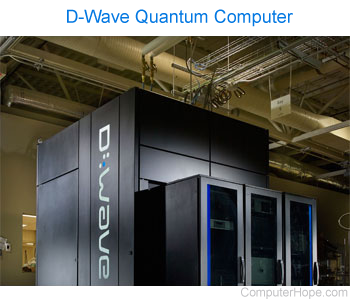Quantum computer

A quantum computer is a device that uses quantum mechanical phenomena such as superposition and entanglement to perform operations on data. A conventional digital computer (classical computer) uses circuits on a plate of semiconducting material (e.g., silicon) to represent binary digits (bits), each in a state of either 1 or 0. In contrast, quantum computers use qubits that represent a "superposition" of both 1 and 0 simultaneously.
The field of quantum computing was first proposed in 1969 and formally introduced in 1980 by Yuri Manin and in 1982 by Richard Feynman. On December 9, 2015, Google presented its findings that using D-Wave quantum computers could solve some problems 100 million times faster than a conventional system.
Quantum computer was featured as a top term of 2005.
What are the dangers of quantum computers?
One of the biggest concerns with quantum computers for most experts is their potential ability to break encryption quickly. All encryption works because it takes too long to decrypt a message without the key. However, encryption that could take today's computers millions of years to decrypt could potentially be done in days, hours, or even minutes on a quantum computer. If this happened, it would break all forms of encryption and allow those with quantum computers to read and see everything, making privacy nearly impossible. Because we depend so much on encryption today, it could also mean the end of civilization.
Like Y2K, Y2Q describes the year when quantum computers begins breaking encryption. As of the end of 2024, with the introduction of Google's Willow quantum computer chip, experts believe quantum computers will crack encryption by 2029.
Bit, Circuit, Computer, CPU terms, Mainframe, Quantum, Qubit, Supercomputer
